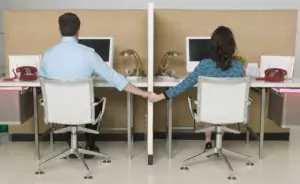 It is not a secret that most of the population in developed countries work in the sphere of intellectual labor, which almost always means working in offices. The corporate culture of capitalistic societies implies that at least half of the office worker’s day is spent at the workplace; and since working with other people inevitably requires communication and interaction, relationships between coworkers establish almost out of necessity. In this case, we are talking about workplace relationships, which can be divided into romantic, friendly, and competitive categories.
It is not a secret that most of the population in developed countries work in the sphere of intellectual labor, which almost always means working in offices. The corporate culture of capitalistic societies implies that at least half of the office worker’s day is spent at the workplace; and since working with other people inevitably requires communication and interaction, relationships between coworkers establish almost out of necessity. In this case, we are talking about workplace relationships, which can be divided into romantic, friendly, and competitive categories.

✅ AI Essay Writer ✅ AI Detector ✅ Plagchecker ✅ Paraphraser
✅ Summarizer ✅ Citation Generator
According to Forbes, 59% of American office workers have at least once in their lifetimes dated a colleague; this means that workplace romance is an incredibly widespread phenomenon (Forbes). For example, the U.S. President Barack Obama met his current wife while working at a Chicago law firm in 1989; Michele Obama used to be his supervisor back then. Among other famous people who found their counterparts at the workplace, one can mention Bill and Melinda Gates, Brad Pitt and Angelina Jolie, Rupert Murdoch and Wendi Deng. And though, according to statistics, office romances often end up with marriage and a happy end, such relationships can have adverse outcomes as well. According to the research conducted by Charles A. Pierce, an associate professor of management in the Fogelman College of Business and Economics at the University of Memphis, office relationships can lead to sexual harassment; his research states that since 1980, there has been more than 50 federal and state workplace romance-sexual harassment legal cases (Society for Industrial and Organizational Psychology).
Another type of office relationship is friendship. Usually, you can choose your friends, but cannot choose colleagues. Fortunately, you also have an option to make friends with colleagues. Making friends with the right group of people can boost one’s career; it can also make a person feel more comfortable at the workplace. On the other hand, office friendships can burn out quickly; a change in a workplace, even within one office, can negatively affect a friendly relationship. Among other factors that affect office friendship are changes in department or position (Monster). This can especially refer to cases if a person takes an executive position and thus has to monitor and organize the work of their friends.
Workplace competition is another natural type of office relationship. Competition can be created by an employee’s desire to overcome his or her colleagues in terms of quality and quantity of work done. At the same time, along with high productivity, increased levels of stress and developing a defensive line of behavior can also be the results of workplace competition (Chron). Stress is caused by a need not only to perform one’s daily duties, but to perform better than colleagues; a person in a competitive environment often worries about being compared with others, especially by supervisors, and thus has to be ready to explain and defend their results of work.
Office work today assumes developing not only business, but also personal relationships. The most common type of such relationships are romance, friendship, and competition. Each type can have its own advantages or disadvantages. For example, an office romance can end up both with marriage or sexual harassment; friendship can help workers better overcome obstacles and decrease stress, but can burn out easily. Finally, office competition can increase productivity, but leads to increased stress and to the development of defensive behavior.
References
Adams, Susan. “The State of the Office Romance, 2013.” Forbes. Forbes Magazine, 13 Feb. 2013. Web. 30 Sept. 2013. <http://www.forbes.com/sites/susanadams/2013/02/13/the-state-of-the-office-romance-2013/>.
“Romance in the Office is Common Occurrence.” Society for Industrial and Organizational Psychology. N.p., n.d. Web. 30 Sept. 2013. <http://www.siop.org/Media/News/office_romance.aspx>.
Bryant, Susan. “Workplace Friendships: Asset or Liability?” Monster. N.p., n.d. Web. 30 Sept. 2013. <http://career-advice.monster.com/in-the-office/workplace-issues/workplace-friendships-asset-or-liab/article.aspxhttp://career-advice.monster.com/in-the-office/workplace-issues/workplace-friendships-asset-or-liab/article.aspx>.
“Signs of a Competitive Workplace.” Chron. N.p., n.d. Web. 30 Sept. 2013. <http://work.chron.com/signs-competitive-workplace-2543.html>.
Follow us on Reddit for more insights and updates.





Comments (0)
Welcome to A*Help comments!
We’re all about debate and discussion at A*Help.
We value the diverse opinions of users, so you may find points of view that you don’t agree with. And that’s cool. However, there are certain things we’re not OK with: attempts to manipulate our data in any way, for example, or the posting of discriminative, offensive, hateful, or disparaging material.
Comments are closed.